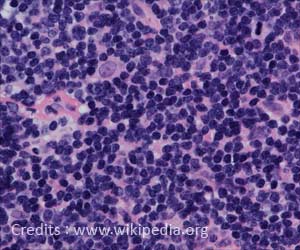
‘Hematopoietic Cell Transplantation (HCT) for non-Hodgkin lymphoma (NHL) patients should not be considered only based on age.’
Tweet it Now
No significant differences were found in the 4-year overall survival (46% vs. 51%, p=0.07) and disease relapse/progression (42% vs. 41%, p=0.82) after allogeneic HCT for patients in the 65 and older age group (median age 68), compared to patients in the 55-64 age group (median age 60). No significant differences were found in the cumulative incidence of grade 2-4 acute graft-versus-host disease (GVHD) at day 180 in the 55-64 years and ≥65 years cohorts: 37% vs 35%, respectively (p=0.38). The cumulative incidence of chronic GVHD at 2 years was also comparable in the 55-64 year age group and ≥65 year age group: 48% vs. 45%, respectively (p=0.25).
"Age alone should not be a determining factor in the decision to refer older patients for transplant consultation to determine patient eligibility," said Nirav Shah, M.D., lead author and assistant professor of medicine at the Medical College of Wisconsin's Division of Hematology and Oncology. "Advances in conditioning regimens and progress in post-transplant care have allowed more patients more than 65 years old or those with co-morbidities to undergo allogeneic HCT. In 2017 alone, nearly 19% of transplant patients were more than 65 years old."
In addition to age, another barrier that patients and their providers face in choosing transplant as a treatment option is the potential lack of insurance coverage. Currently, the Centers for Medicare & Medicaid Services (CMS) has expanded coverage to HCT for myelodysplastic syndromes, sickle cell disease, myelofibrosis and multiple myeloma under Coverage with Evidence Development (CED). Transplants for these indications need to take place within a CMS-approved clinical study that meets federal guidelines.
Dr. Shah noted that use of allogeneic HCT to treat patients with NHL age 65 years or older in the United States is limited by Medicare coverage for this indication. Coverage for lymphoma is currently available to those states that reside in the National Government Services (NGS) jurisdiction. While this effort has been applauded, clearer coverage policy for beneficiaries with lymphoma in all states is needed in order to reduce this access barrier for patients who are eligible for HCT.
Advertisement
This study acknowledges HCT as an important and effective treatment for patients with NHL regardless of age.
Advertisement
Source-Eurekalert













